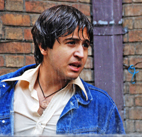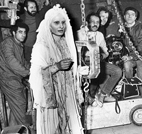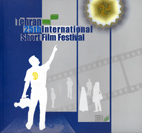
-
The Third Wave
 Arash Sajjadi Hosseini, director of The Third Wave has announced that it is a surrealistic film which does not allow viewers to easily differentiate between real and unreal scenes. Making such films has been always a problem in the Iranian cinema with the most important problem being lack of suitable screenplays as well as technical facilities to construct imaginary and dream scenes in a believable manner. Travelers, the prominent work of Bahram Baizai, is one of the best films with signs of top surrealistic films of world cinema in it. The Third Wave is based on two parallel stories belonging to two periods of the Iranian history. Arash Sajjadi Hosseini, director of The Third Wave has announced that it is a surrealistic film which does not allow viewers to easily differentiate between real and unreal scenes. Making such films has been always a problem in the Iranian cinema with the most important problem being lack of suitable screenplays as well as technical facilities to construct imaginary and dream scenes in a believable manner. Travelers, the prominent work of Bahram Baizai, is one of the best films with signs of top surrealistic films of world cinema in it. The Third Wave is based on two parallel stories belonging to two periods of the Iranian history.
-
Burden of Being
 Amir Qavidel is an experienced director of the Iranian cinema who has also worked for as assistant to Samuel Khachikian for many years. His films have inspired famous directors who followed him like Massoud Kimiaei. Qavidel made many films after the revolution. He was also assistant to Khachikian in his last works. There are melodramas and horror movies on his track record which are of medium quality. Burden of Being is his latest film in horror genre and is about a girl who tries unconventional means to overcome her problems. His last film was made eight years ago. In the meantime, he was supposed to direct another film, but a serious accident caused him to be replaced by another director. Qavidel has noted that he made Burden of Being to pay tribute to his mentor, Khachikian who has made early horror movies of the Iranian cinema. Amir Qavidel is an experienced director of the Iranian cinema who has also worked for as assistant to Samuel Khachikian for many years. His films have inspired famous directors who followed him like Massoud Kimiaei. Qavidel made many films after the revolution. He was also assistant to Khachikian in his last works. There are melodramas and horror movies on his track record which are of medium quality. Burden of Being is his latest film in horror genre and is about a girl who tries unconventional means to overcome her problems. His last film was made eight years ago. In the meantime, he was supposed to direct another film, but a serious accident caused him to be replaced by another director. Qavidel has noted that he made Burden of Being to pay tribute to his mentor, Khachikian who has made early horror movies of the Iranian cinema.
-
Shoot the Target
 Many people have already switched to film directing which include screenwriters, assistant directors, photographers, and critics. However, there are few sound recordists who have turned directors. Mohammad Katiraei, director of Shoot the Target was sound recordist in Vahid Mousaeian’s and Saman Salour’s films and this is his first experience as director. Shoot the Target is about young Iranian generation who becomes delinquent due to identity problem. The producer, Jahangir Kowsari, has already produced films for novice directors to show his interest in working with young people. He has produced early works of such directors as Mona Zandi, Shalizeh Arefpour, and Mohammad Ebrahim Moayyeri and has also helped Katiraei with his first film. Many people have already switched to film directing which include screenwriters, assistant directors, photographers, and critics. However, there are few sound recordists who have turned directors. Mohammad Katiraei, director of Shoot the Target was sound recordist in Vahid Mousaeian’s and Saman Salour’s films and this is his first experience as director. Shoot the Target is about young Iranian generation who becomes delinquent due to identity problem. The producer, Jahangir Kowsari, has already produced films for novice directors to show his interest in working with young people. He has produced early works of such directors as Mona Zandi, Shalizeh Arefpour, and Mohammad Ebrahim Moayyeri and has also helped Katiraei with his first film.
-
3rd Police Film Festival
Out of different annual festivals in Iran, Police Film Festival has been both sensational and attracted large audience in recent years due to correct strategy of its organizers. The festival aims to appreciate worthwhile police films aimed at reducing social maladies. This year, 49 features, 154 documentaries and 74 telefilms were present in the festival. Alireza Sajjadpour, who manages this festival, is a screenwriter and producer of the Iranian cinema and television and is close to president in cultural affairs. Before taking charge of this festival, he was manager of one of the best cultural complexes in Tehran. Davoud Rashidi and Ezzatollah Entezami, two seasoned Iranian actors, addressed the festival and talked about its important impact.
-
2nd Academy of Asia-Pacific Screen Award
The second edition of Academy of Asia-Pacific Screen Award introduced its winners in nine sections on November 11, 2008, with representatives of the Iranian cinema winning two awards. Behnam Behzadi’s We Only Live Twice was nominated for the best screenplay; Alireza Aghakhani; actor of Behzadi’s film, and Reza Naji, actor of Song of the Sparrows, were nominated for the best performance by an actor; and Mehdi Moniri’s Tinar was nominated for the best documentary feature film. Finally, Reza Naji won an award for the best performance by an actor and Mehdi Moniri’s beautiful documentary, Tinar, won UNESCO Award.
-
Documentaries about prominent Iranian films
 As DVDs become popular in Iran and state-run television is willing to focus on prominent feature films made after the revolution, Nahid Delagah, the experienced producer of documentary films, has taken charge of producing 30 documentaries about 30 important Iranian films. She invited young documentarians to take part in this project. Their films included footages of behind the scenes, interviews with production crew, viewpoints of critics, and historical role of those films. Before Delagah, Reza Mirkarimi was in charge of this project. Major films considered in this project have been produced in the past 30 years and will be aired on the state television to mark the 30th anniversary of the Islamic Revolution. As DVDs become popular in Iran and state-run television is willing to focus on prominent feature films made after the revolution, Nahid Delagah, the experienced producer of documentary films, has taken charge of producing 30 documentaries about 30 important Iranian films. She invited young documentarians to take part in this project. Their films included footages of behind the scenes, interviews with production crew, viewpoints of critics, and historical role of those films. Before Delagah, Reza Mirkarimi was in charge of this project. Major films considered in this project have been produced in the past 30 years and will be aired on the state television to mark the 30th anniversary of the Islamic Revolution.
-
Autumnal Saplings
 During the past decade, two state bodies have consistently supported production of short, documentary and experimental films. Documentary and experimental works are generally supported by Documentary and Experimental Film Center (DEFC) while Iranian Young Cinema Society (IYCS) usually supports short films. The first group of films is screened in Cinema Verite Festival while short films are screened and judged in a separate festival which is sponsored by the Iranian Young Cinema Society. The society has introduced many talents to the Iranian cinema, the most prominent of whom was Bahman Qobadi. It has many branches in different cities of Iran where professional principles of cinema are taught and productions which are, in fact, graduates’ theses are supported. Some of those works which are of higher quality are sent to central office of the Society in Tehran for screening in Tehran International Short Film Festival. During the past decade, two state bodies have consistently supported production of short, documentary and experimental films. Documentary and experimental works are generally supported by Documentary and Experimental Film Center (DEFC) while Iranian Young Cinema Society (IYCS) usually supports short films. The first group of films is screened in Cinema Verite Festival while short films are screened and judged in a separate festival which is sponsored by the Iranian Young Cinema Society. The society has introduced many talents to the Iranian cinema, the most prominent of whom was Bahman Qobadi. It has many branches in different cities of Iran where professional principles of cinema are taught and productions which are, in fact, graduates’ theses are supported. Some of those works which are of higher quality are sent to central office of the Society in Tehran for screening in Tehran International Short Film Festival.
|
|
October, 2023
September, 2023
January, 2017
December, 2015
December, 2014
January, 2013
July, 2012
August, 2011
December, 2010
June, 2010
January, 2010
October, 2009
May, 2009
February, 2009
January, 2009
November, 2008
October, 2008
July, 2008
March, 2008
January, 2008
December, 2007
November, 2007
September, 2007
|
|
|

